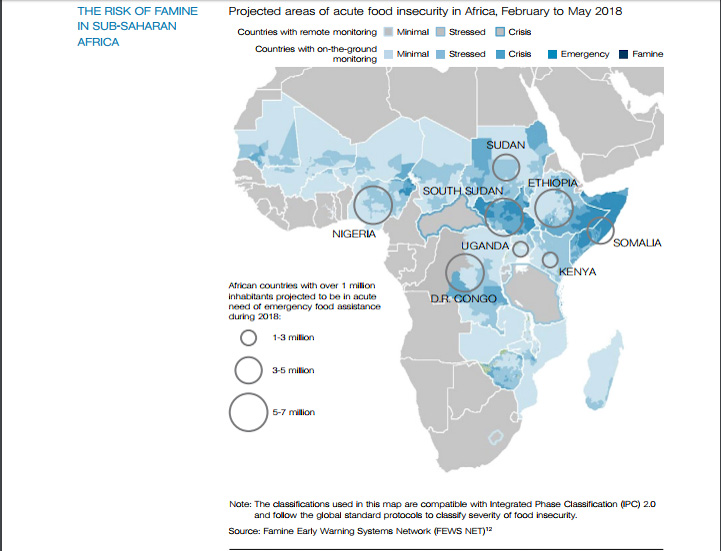Kampala: The 2018 Munich Security report envisages that up to three million Ugandans will suffer hunger this year between the months of February and May.
Under the subtheme Africa: Young and Restless, the report, which was released at the just concluded Munich Security Conference, notes that African countries with over 1 million inhabitants projected to be in acute need of emergency food assistance during 2018.
The reports also show that Uganda’s neighbors, Kenya will not do any better. It has a similar famine projection.
South Sudan, where a civil war and hyper-inflation led to extreme levels of food insecurity, and Somalia, where, the report notes, consecutive droughts have been exacerbated by the actions of jihadist group Al-Shabaab, also remain at risk of famine despite US $3.2 billion in food assistance provided through the UN. Up to seven million and five million people are projected to be at risk in both countries respectively.
It seems it will be a region of hunger as The Democratic Republic of Congo is also projected to have up to seven million hungry people and so is Ethiopia.
Deputy Head of government information seat, Col. Shaban Bantariza, however, dismissed the Munich report saying Uganda can’t go hungry because it has just harvested between January and December.
“Where has food gone, that is their research, despite the influx of refugees into the country, the country has enough,” deputy government spokesperson Col. Shaban Bntaliza added.
He noted that government agencies such as operation wealth creation under the ministry of agriculture are yet to start the distribution of seeds from the next planting.
Last year More than 10 million Ugandans faced hunger and were only saved following the distribution of relief food from government and international agencies.
Trends from 1992 through to 2006 show that Uganda has only managed to register marginal improvements in food security; the problem reducing from 83 percent in 1992/93 to 59 percent by 1999/2000; but rising again to 63 percent by 2002/03—this remained more or less the same in 2005/06.
But Col. Bantariza remains dismissive of the Munich report.
“That is their [Munich Security Conference] research,” he said.
Government is quick to point to the introduction of many agricultural programs—National Agricultural Advisory Services (NAADS), Operation Wealth Creation—to help answer the food question but those have remained paper tigers.
According to Food and Agriculture Organization, Uganda needs a food reserve agency that will backstop food security and protect farmers and consumers from the extremes of food price volatility.
The Munich Security Conference sat last week to
The conferences report pointed a grim picture about the future of Africa, poking holes in the Africa’s century narrative and instead pointed out the need for more job creation for the young Africans.
“The “African Century” narrative appeared to be in full swing when African countries’ financial resources peaked in 2012. Since then, they have been declining, and Africa’s expected “demographic dividend” seems less likely to materialize.
“We must create greater economic opportunities for our youth right at home. If African countries fail to do so for the approximately 20 million youths entering the continent’s labor force every year, a ballooning youth population – deprived of quality education, gainful employment, and political voice – could well lead to widespread unrest and destabilization instead of boosting productivity,” the report reads in part.
Three million Ugandans at the risk of hunger in March- Security Report

- Advertisement -





